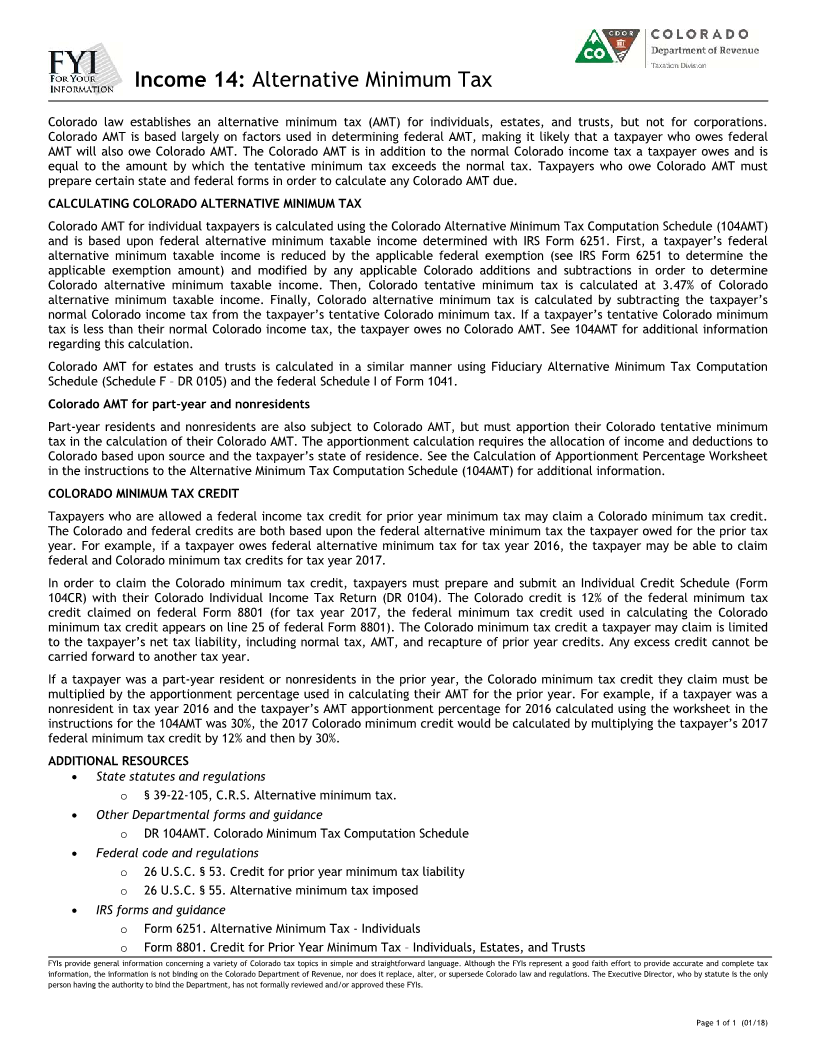
Enlarge image
Income 14: Alternative Minimum Tax
Colorado law establishes an alternative minimum tax (AMT) for individuals, estates, and trusts, but not for corporations.
Colorado AMT is based largely on factors used in determining federal AMT, making it likely that a taxpayer who owes federal
AMT will also owe Colorado AMT. The Colorado AMT is in addition to the normal Colorado income tax a taxpayer owes and is
equal to the amount by which the tentative minimum tax exceeds the normal tax. Taxpayers who owe Colorado AMT must
prepare certain state and federal forms in order to calculate any Colorado AMT due.
CALCULATING COLORADO ALTERNATIVE MINIMUM TAX
Colorado AMT for individual taxpayers is calculated using the Colorado Alternative Minimum Tax Computation Schedule (104AMT)
and is based upon federal alternative minimum taxable income determined with IRS Form 6251. First, a taxpayer’s federal
alternative minimum taxable income is reduced by the applicable federal exemption (see IRS Form 6251 to determine the
applicable exemption amount) and modified by any applicable Colorado additions and subtractions in order to determine
Colorado alternative minimum taxable income. Then, Colorado tentative minimum tax is calculated at 3.47% of Colorado
alternative minimum taxable income. Finally, Colorado alternative minimum tax is calculated by subtracting the taxpayer’s
normal Colorado income tax from the taxpayer’s tentative Colorado minimum tax. If a taxpayer’s tentative Colorado minimum
tax is less than their normal Colorado income tax, the taxpayer owes no Colorado AMT. See 104AMT for additional information
regarding this calculation.
Colorado AMT for estates and trusts is calculated in a similar manner using Fiduciary Alternative Minimum Tax Computation
Schedule (Schedule F – DR 0105) and the federal Schedule I of Form 1041.
Colorado AMT for part-year and nonresidents
Part-year residents and nonresidents are also subject to Colorado AMT, but must apportion their Colorado tentative minimum
tax in the calculation of their Colorado AMT. The apportionment calculation requires the allocation of income and deductions to
Colorado based upon source and the taxpayer’s state of residence. See the Calculation of Apportionment Percentage Worksheet
in the instructions to the Alternative Minimum Tax Computation Schedule (104AMT) for additional information.
COLORADO MINIMUM TAX CREDIT
Taxpayers who are allowed a federal income tax credit for prior year minimum tax may claim a Colorado minimum tax credit.
The Colorado and federal credits are both based upon the federal alternative minimum tax the taxpayer owed for the prior tax
year. For example, if a taxpayer owes federal alternative minimum tax for tax year 2016, the taxpayer may be able to claim
federal and Colorado minimum tax credits for tax year 2017.
In order to claim the Colorado minimum tax credit, taxpayers must prepare and submit an Individual Credit Schedule (Form
104CR) with their Colorado Individual Income Tax Return (DR 0104). The Colorado credit is 12% of the federal minimum tax
credit claimed on federal Form 8801 (for tax year 2017, the federal minimum tax credit used in calculating the Colorado
minimum tax credit appears on line 25 of federal Form 8801). The Colorado minimum tax credit a taxpayer may claim is limited
to the taxpayer’s net tax liability, including normal tax, AMT, and recapture of prior year credits. Any excess credit cannot be
carried forward to another tax year.
If a taxpayer was a part-year resident or nonresidents in the prior year, the Colorado minimum tax credit they claim must be
multiplied by the apportionment percentage used in calculating their AMT for the prior year. For example, if a taxpayer was a
nonresident in tax year 2016 and the taxpayer’s AMT apportionment percentage for 2016 calculated using the worksheet in the
instructions for the 104AMT was 30%, the 2017 Colorado minimum credit would be calculated by multiplying the taxpayer’s 2017
federal minimum tax credit by 12% and then by 30%.
ADDITIONAL RESOURCES
State statutes and regulations
o § 39-22-105, C.R.S. Alternative minimum tax.
Other Departmental forms and guidance
o DR 104AMT. Colorado Minimum Tax Computation Schedule
Federal code and regulations
o 26 U.S.C. § 53. Credit for prior year minimum tax liability
o 26 U.S.C. § 55. Alternative minimum tax imposed
IRS forms and guidance
o Form 6251. Alternative Minimum Tax - Individuals
o Form 8801. Credit for Prior Year Minimum Tax – Individuals, Estates, and Trusts
FYIs provide general information concerning a variety of Colorado tax topics in simple and straightforward language. Although the FYIs represent a good faith effort to provide accurate and complete tax
information, the information is not binding on the Colorado Department of Revenue, nor does it replace, alter, or supersede Colorado law and regulations. The Executive Director, who by statute is the only
person having the authority to bind the Department, has not formally reviewed and/or approved these FYIs.
Page 1 of 1 (01/18)